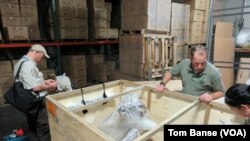A quartet of special agents and wildlife inspectors from the U.S. Fish and Wildlife Service arrive at an air cargo warehouse near Seattle-Tacoma International Airport. They’re armed, not with guns, but with handbooks on African wildlife and power screwdrivers, and they want to look inside several wooden crates.
The manifests say the crates contain trophies from big game hunts in southern Africa, and that could mean illegal ivory. The lids come off to reveal a wide assortment of skulls, taxidermy, antelope horns and mounted heads swaddled in bubble wrap.
In this case, says supervisory inspector John Goldman, it's okay because the tusk in the crate belongs to a warthog skull. That's not a protected species.
Stopping the slaughter
Ivory trafficking and poaching kill 35,000 African elephants each year, according to statistics from the Wildlife Conservation Society. Recent investigations of elephant and rhino poaching in Africa attribute an upsurge in trafficking to demand from China and neighboring Southeast Asian countries.
The subject of wildlife trafficking came up when President Barack Obama met with Chinese President Xi Jinping late last month. A White House list of the bilateral agreements reached during that summit included a promise of action from China to match a previously announced U.S. crackdown on the ivory trade.
Commercial imports of elephant ivory have been banned by national laws and international treaty for decades. At present, vintage African elephant ivory may be sold in the United States only if the owner can document that it arrived in this country before 1990.
Some observers say that those sales do not materially contribute to the illegal ivory trade. But wildlife advocacy groups assert the U.S. has one of the biggest markets in the world for ivory, legal and illegal, and that ending demand at home is a key to stopping the slaughter of elephants abroad.
So activists are pressing states to pass their own laws to deter the poaching of elephants and rhinos.
Local impact on a global trade
The forests and savannas of Africa may seem a world away, but animal contraband does pass through the Pacific Northwest. Although there are about three to four interceptions per year of elephant ivory jewelry or carvings or an improperly imported, sport-hunted elephant trophy at the Seattle/Tacoma seaport and airport and along the nearby border with Canada, John Goldman observed there’s ample reason to believe this is a legitimate problem.
"We are arguably the fourth largest seaport. It's a growing airport, a growing region, there's tremendous affluence here - all of these things all point to the potential for greater illegal wildlife imports and exports."
But with federal laws to address it, and inspectors who don’t find elephant or rhino products locally very often, why do groups such as the Humane Society of the U.S., Wildlife Conservation Society, Natural Resources Defense Council and others want new state laws against it?
The Humane Society’s Jennifer Hillman said it sends a message: “Having a much deeper level of enforcement at the state level is going to help overall with the trafficking that’s happening intrastate.”
And that’s the direction New York, New Jersey and California have gone, banning the sale of virtually all ivory within their states.
The Oregon and Washington legislatures considered similar measures during their sessions earlier this year, but those did not pass. Opposition came from knife and gun enthusiasts and antique collectors like Stuart Halsan. He argues it would be unfair to owners of legally-acquired ivory handled guns and knives.
"The truth is that poaching in Africa cannot be stopped by a Washington state initiative," he insisted. "It wouldn't work and it would make legal antiques worthless."
Wildlife advocates are now taking their campaign directly to voters with ballot initiatives in Washington state and Oregon. They make no bones about seeking a broad ban on ivory sales, no matter its provenance. The activists argue the legal ivory trade provides cover for sales of illegal trinkets and carvings.










